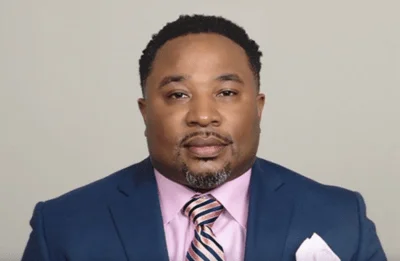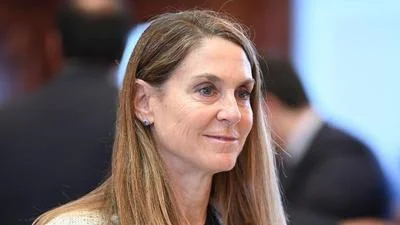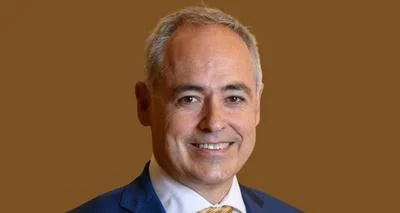Kevin John Olickal, Illinois State Representative from the 16th District | Illinois General Assembly
Kevin John Olickal, Illinois State Representative from the 16th District | Illinois General Assembly
According to the Illinois General Assembly site, the legislature summarized the bill's official text as follows: "Creates the Responsibility in Firearm Legislation (RIFL) Act. Establishes a firearms manufacturer licensing program in the Department of Financial and Professional Regulation, with certain requirements, including that the sum of all fees for firearms manufacturer licenses shall be equal to the public health costs and financial burdens from firearm injuries and deaths. Provides that, beginning January 1, 2028, a manufacturer of firearms may not operate in this State without a license from the Department and that a manufacturer who violates this provision is subject to a civil penalty of up to $1,000,000 per month. Provides that, beginning January 1, 2028, a retailer may not sell a firearm to a consumer in this State from a manufacturer who does not have a license from the Department and that a retailer who violates this provision is subject to a civil penalty of up to $10,000 per violation, with certain requirements. Establishes the RIFL Fund as a special fund in the State treasury, with certain limitations. Provides that the proceeds from fees under the licensing program shall be deposited into the RIFL Fund. Establishes a financial assistance program in the Department with moneys from the RIFL Fund for financial assistance to victims of firearms and for other purposes. Provides that the Department shall contract with a program administrator to administer the financial assistance program, with certain requirements. Provides that the Department shall adopt rules for financial assistance to victims of firearms, with certain requirements, including regarding exemption from certain State taxes. Provides that the Department may contract with a program administrator to implement or administer any part of the Act, with certain requirements. Provides that the Illinois State Police shall report certain information to the Department. Provides that the Department may provide for other civil penalties of no more than $1,000 per violation. Provides that the Attorney General may enforce the Act. Makes other provisions. Amends the State Finance Act to make conforming changes. Amends the Illinois Income Tax Act to make conforming changes."
The following is our breakdown, based on the actual bill text, and may include interpretation to clarify its provisions.
In essence, this bill, titled the Responsibility in Firearm Legislation (RIFL) Act, implements a licensing program for firearms manufacturers in Illinois starting January 1, 2028, with fees set to match the public health costs of firearm-related injuries and deaths. Makers or retailers engaging in transactions without proper licensing post-2028 face substantial civil fines. Monies accrued from these fees will go to the newly created RIFL Fund, intended to provide financial assistance to gun violence victims. The Illinois State Police must report firearm recovery data to the overseeing Department. The Department of Financial and Professional Regulation will manage the program’s implementation, and the Attorney General will enforce compliance. The bill also amends the State Finance Act and the Illinois Income Tax Act to accommodate the changes.
Kevin John Olickal has proposed another 13 bills since the beginning of the 104th session.
Olickal graduated from Ohio State University in 2015 with a BS and again in 2025 from Loyola University Chicago School of Law with a JD.
Kevin John Olickal is currently serving in the Illinois State House, representing the state's 16th House District. He replaced previous state representative Denyse Wang Stoneback in 2023.
Bills in Illinois follow a multi-step legislative process, beginning with introduction in either the House or Senate, followed by committee review, floor debates, and votes in both chambers before reaching the governor for approval or veto. The General Assembly operates on a biennial schedule, and while typically thousands of bills are introduced each session, only a fraction successfully pass through the process to become law.
You can read more about bills and other measures here.
| Bill Number | Date Introduced | Short Description |
|---|---|---|
| HB3320 | 02/06/2025 | Creates the Responsibility in Firearm Legislation (RIFL) Act. Establishes a firearms manufacturer licensing program in the Department of Financial and Professional Regulation, with certain requirements, including that the sum of all fees for firearms manufacturer licenses shall be equal to the public health costs and financial burdens from firearm injuries and deaths. Provides that, beginning January 1, 2028, a manufacturer of firearms may not operate in this State without a license from the Department and that a manufacturer who violates this provision is subject to a civil penalty of up to $1,000,000 per month. Provides that, beginning January 1, 2028, a retailer may not sell a firearm to a consumer in this State from a manufacturer who does not have a license from the Department and that a retailer who violates this provision is subject to a civil penalty of up to $10,000 per violation, with certain requirements. Establishes the RIFL Fund as a special fund in the State treasury, with certain limitations. Provides that the proceeds from fees under the licensing program shall be deposited into the RIFL Fund. Establishes a financial assistance program in the Department with moneys from the RIFL Fund for financial assistance to victims of firearms and for other purposes. Provides that the Department shall contract with a program administrator to administer the financial assistance program, with certain requirements. Provides that the Department shall adopt rules for financial assistance to victims of firearms, with certain requirements, including regarding exemption from certain State taxes. Provides that the Department may contract with a program administrator to implement or administer any part of the Act, with certain requirements. Provides that the Illinois State Police shall report certain information to the Department. Provides that the Department may provide for other civil penalties of no more than $1,000 per violation. Provides that the Attorney General may enforce the Act. Makes other provisions. Amends the State Finance Act to make conforming changes. Amends the Illinois Income Tax Act to make conforming changes. |
| HB3098 | 02/06/2025 | Amends the Consumer Electronics Recycling Act. Adds and changes definitions. Changes references to residential covered electronic devices (CEDs) to references to CEDs from covered entities. Adds a nonprofit organization or recycler to certain provisions regarding the use of a retail or private network (rather than only retail) collection site with the agreement of the applicable retailer under certain local agreements. Changes references to retail collection sites to references to retail or private network collection sites. Adds to requirements for certain agreements, including those to be reduced to writing and included in the manufacturer e-waste program plan. Adds to requirements for the manufacturer e-waste program plan. Adds conditions in certain provisions regarding the applicable county, municipal joint action agency, or municipality. Adds certain waivers for charges for shortfalls in provisions regarding collection of CEDs. Adds requirements for the Advisory Electronics Task Force to submit certain information to the Environmental Protection Agency, as well as to communicate regarding certain updates and certain feedback. Adds provisions regarding education and consumer awareness requirements. Deletes an automatic repeal provision. |
| HB3177 | 02/06/2025 | Amends the Innovations for Transportation Infrastructure Act. Provides that the Department of Transportation or the Illinois State Toll Highway Authority may use the design-build project delivery method for transportation facilities if the capital costs for transportation facilities delivered utilizing the design-build project delivery method or Construction Manager/General Contractor project delivery method or Alternative Technical Concepts in a design-bid-build project delivery method do not for transportation facilities delivered by the Department, exceed the value of 20% of the projects annually programmed in (rather than $400 million of contracts awarded during) the Department's multi-year highway improvement program on an annual basis (rather than for any 5-year period). Removes language that provides that notwithstanding any other law, and as authority supplemental to its existing powers, the Department may use the Construction Manager/General Contractor project delivery method for up to 2 transportation facilities per year. Effective immediately. |
| HB2909 | 02/05/2025 | Amends the Illinois Human Rights Act. Changes the Public Accommodations and Financial Credit Articles to prohibit discrimination on the basis of citizenship, primary language, or immigration status that includes discrimination against a person because of the person's actual or perceived characteristic or characteristics within the listed categories or that the person is associated with a person who has, or is perceived to have, any particular characteristic or characteristics within the listed categories. "Citizenship" means the status of being: (i) a born U.S. citizen; (ii) a naturalized U.S. citizen; or (iii) a U.S. national. "Immigration status" means citizenship of some country other than the United States, including stateless persons, and the specific authority, or lack thereof, to reside in or otherwise to be present in the United States. "Primary language" means a person's preferred language for communication. Provides that it is not a civil rights violation to verify immigration status or any discrimination based upon verified immigration status if required by federal law. Nothing in the Act may be construed to require the provision of services or documents in a language other than English beyond that which is otherwise required by other provisions of federal, State, or local law. Provides that a civil rights violation for a violation of Articles 4 and 5 may include statutory damages of 3 times the amount of actual damages sustained or $8,000, whichever is the greater. |
| HB2348 | 01/30/2025 | Amends the Unified Code of Corrections. Provides that the Prisoner Review Board shall be the authority for setting conditions for mandatory supervised release under specified provisions and determining whether a violation of those conditions warrant revocation of mandatory supervised release or the imposition of other sanctions. Provides that the Board shall hear by at least one member and through a panel of at least 3 members determine the conditions of mandatory supervised release, determine the time of discharge from mandatory supervised release, impose sanctions for violations of mandatory supervised release, and revoke mandatory supervised release for those sentenced under specified provisions. Provides that if a person was originally prosecuted under the provisions of the Criminal Code of 1961 or the Criminal Code of 2012, sentenced under the provisions of the Act pursuant to the Juvenile Court Act of 1987, and convicted as an adult and committed to the Department of Juvenile Justice, the Department of Juvenile Justice shall, no less than 120 days prior to the date that the person reaches the age of 21, send written notification to the Prisoner Review Board indicating the day upon which the committed person will achieve the age of 21. Requires the Prisoner Review Board to conduct a hearing with no less than 3 members to determine whether or not the minor shall be assigned mandatory supervised release or be transferred to the Department of Corrections prior to the minor's 21st birthday. |
| HB1922 | 01/29/2025 | Amends the Medical Assistance Article of the Illinois Public Aid Code. In a provision concerning payments to nursing facilities to increase compensation for certified nursing assistants (CNA), removes language requiring the Department of Healthcare and Family Services to establish, by rule, payments to nursing facilities equal to Medicaid's share of the tenure wage increments for all reported CNA employee hours compensated. Instead provides that, based on the schedule set forth in the amendatory Act, the Department shall pay to each facility Medicaid's share of the facility's estimated CNA hours performed by employees and agency workers, estimated overtime hours, and benefits and taxes paid to and on behalf of CNA workers at the beginning of each quarter. Provides that moneys paid by the Department to each facility and moneys paid by each facility to workers and agencies or on behalf of workers and agencies shall be reconciled at the end of each quarter. Sets for a schedule concerning the calculation of tenure compensation which shall include: (i) compensation for regular CNA hours; (ii) overtime calculated at time and a half; and (iii) benefits and taxes at 25%. Provides that estimates of overtime shall be calculated at time and a half and benefits and taxes at 25%. Requires the Department to pay the facility for qualifying promotions estimated at the beginning of each quarter and reconciled at the end of the quarter. Effective immediately. |
| HB1643 | 01/23/2025 | Amends the Unified Code of Corrections. Creates the Department of Corrections Independent Ombudsperson Law. Provides that the Corrections Oversight Committee shall appoint the Independent Corrections Ombudsperson. Provides that the Independent Corrections Ombudsperson shall serve a term of 6 years and may be only removed from office by the Governor for cause. Provides that the Independent Corrections Ombudsperson shall not be a current or former employee of the Department of Corrections, the Department of Juvenile Justice, or a contractor for those departments. Establishes the duties of the Independent Corrections Ombudsperson. Provides that the Independent Corrections Ombudsperson shall: (1) monitor and inspect facilities of the Department of Corrections; (2) investigate unresolved complaints from committed persons, their families, and corrections staff regarding correctional facility conditions and treatment of committed persons; (3) create a uniform reporting system and collect and analyze data related to deaths, suicides, sexual and physical assaults, lockdowns, staff vacancies and committed persons-to-staff ratios, visits to committed persons, and use of solitary confinement in correctional facilities; (4) conduct regular inspections of correctional facilities at least once every year for facilities not meeting standards, and at least once every 36 months for facilities that are meeting standards; and (5) publicly issue periodic facility inspection reports and an annual report with recommendations and a summary of data. Establishes other duties of the Independent Corrections Ombudsperson. Provides that the Independent Corrections Ombudsperson shall report regularly on its activities, investigations, and inspections, including an annual report, which shall be presented to and discussed at a meeting of the Corrections Oversight Committee and make other reports on topics of special interest. Provides that all reports of the Independent Corrections Ombudsperson shall be made available to the public online and provided to the Director of Corrections, the Governor, the Attorney General, and the House and Senate Judiciary Committees. Effective July 1, 2026. |
| HB1438 | 01/17/2025 | Appropriates $1,500,000 from the General Revenue Fund to the Office of the Independent Corrections Ombudsperson for the Offices ordinary and contingent expenses. Effective July 1, 2025. |
| HB1439 | 01/17/2025 | Amends the Illinois Insurance Code, the Dental Care Patient Protection Act, and the Dental Service Plan Act. Provides that no insurer, dental service plan corporation, professional service corporation, insurance network leasing company, company offering a managed care dental plan, company offering a point-of-service plan, or any company that amends, delivers, issues, or renews an individual or group policy of accident and health insurance that provides dental insurance in this State may deny coverage for replacement of teeth to any insured on the basis of those teeth having been extracted or otherwise lost prior to the person becoming covered under the plan. |
| HB1440 | 01/17/2025 | Amends the Property Tax Code. Provides that tax deeds issued to the county as trustee shall be recorded by the county and shall not require a municipal transfer stamp or be subject to any municipal real estate transfer taxes, requirements, or certifications prior to recording. |
| HB1426 | 01/16/2025 | Amends the Juvenile Court Act of 1987. Repeals a provision excluding certain minors accused of committing specified crimes from the jurisdiction of the juvenile court. Effective immediately. |
| HB1427 | 01/16/2025 | Creates the Prohibition of Algorithmics in Rent Act. Provides that in setting the amount of rent to be charged to a tenant for the occupancy of a residential premises, including determining any change in the amount of rent to be charged for the renewed occupancy of a residential premises, a landlord shall not employ, use, or rely upon, or cause another person to employ, use, or rely upon, an algorithmic device that uses, incorporates, or was trained with nonpublic competitor data. Defines "algorithmic device" to mean a device that uses one or more algorithms to perform calculations of data, including data concerning local or statewide rent amounts being charged to tenants by landlords, for the purpose of advising a landlord concerning the amount of rent that the landlord may consider charging a tenant. Provides that this definition does not include (i) any report published periodically, but no more frequently than monthly, by a trade association that receives renter data and publishes it in an aggregated and anonymous manner; or (ii) a product used for the purpose of establishing rent or income limits in accordance with the affordable housing program guidelines of a local government, the State, the federal government, or other political subdivision. Amends the Consumer Fraud and Deceptive Business Practices Act to make a corresponding change. Provides that any person who violates the Prohibition of Algorithmics in Rent Act commits an unlawful practice within the meaning of the Consumer Fraud and Deceptive Business Practices Act. |
| HB1428 | 01/16/2025 | Creates the Isolated Confinement Restriction Act. Provides that the Act may be referred to as the Nelson Mandela Act. Provides that a committed person may not be in isolated confinement for more than 10 consecutive days. Provides that a committed person may not be in isolated confinement for more than 10 days in any 180-day period. Provides that the provision of basic needs and services, such as nutritious food, clean water, hygiene supplies, clothing, bedding and mattress, religious materials, legal materials, access to grievance forms, and access to medical and mental health, shall not be restricted as a form of punishment or discipline for committed persons in isolated confinement. Provides that a committed person in protective custody may opt out of that status by providing informed, voluntary, written refusal of that status. Provides that a committed person shall not be placed in isolated confinement if the committed person: (1) is 21 years of age or younger; (2) is 55 years of age or older; (3) has a disability as defined in the Americans with Disabilities Act of 1990; or (4) is pregnant or postpartum. Provides that nothing in the Act is intended to restrict any rights or privileges a committed person may have under any other statute, rule, or regulation. Amends the Unified Code of Corrections to make conforming changes. Effective immediately. |
| HB1429 | 01/16/2025 | Amends the Bill of Rights for the Homeless Act. Prohibits the State or a unit of local government from creating or enforcing policies or ordinances imposing fines or criminal penalties against people experiencing unsheltered homelessness for occupying or engaging in life-sustaining activities on public property. Provides exceptions to maintain access to property or address risks to public health and safety. Creates a necessity defense for charges alleging violation of laws criminalizing life-sustaining activities while the individual was experiencing unsheltered homelessness. Defines terms. Limits the exercise of concurrent home rule powers. |






 Alerts Sign-up
Alerts Sign-up